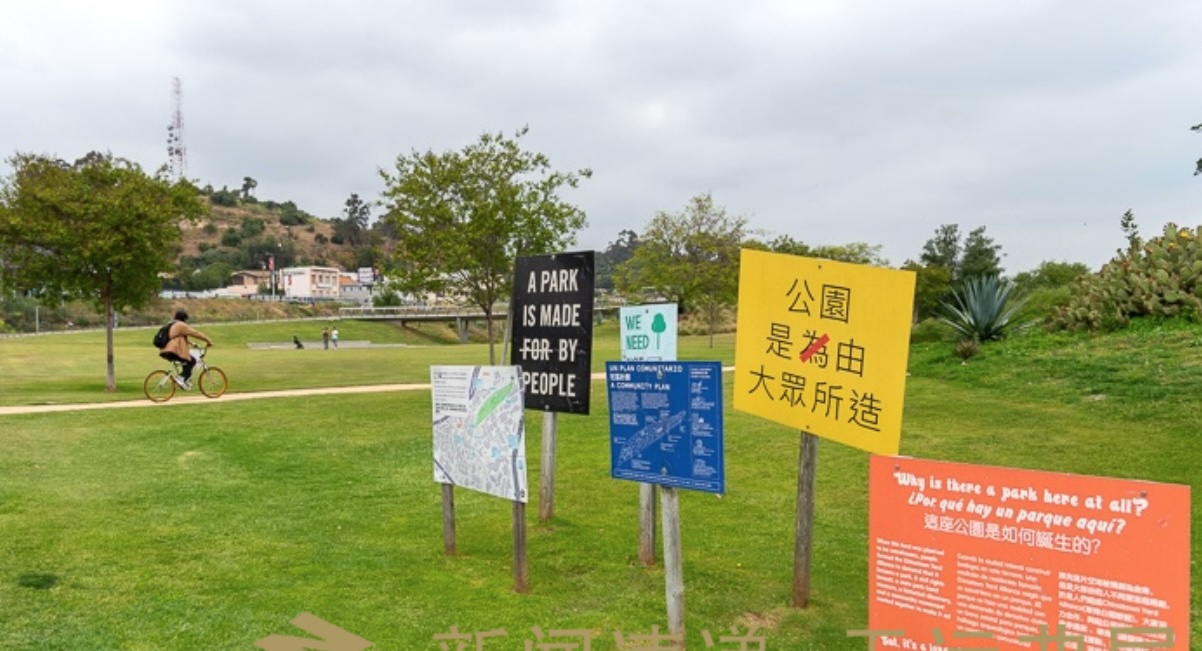Keyang Pang | News Express
When the 34-acre Los Angeles State Historic Park was officially opened in 2017, thousands of community leaders and elected officials, including then-California Governor Jerry Brown, were present to witness the celebration of this greening project located between Los Angeles Chinatown and the Los Angeles River to better serve California’s diverse population.
But, have the elderly in Chinatown, which is closest to the park, really enjoyed the benefits of greening over the last seven years?
According to the official website of Los Angeles State Historic Park, the area where the park is located “is one of the most underserved communities in Los Angeles with a long history and ethnic diversity. It was once the site of the Tongva indigenous community and later became a gathering place for immigrants.
In the 1990s, community activists in Los Angeles united to oppose the construction of industries and warehouses here, and eventually pushed the state government to build it into a green open space that the community urgently needs.”
Kathleen Johnson, executive director of Los Angeles River State Park Partners, a nonprofit organization dedicated to supporting state parks around the Los Angeles River and promoting the construction of Los Angeles State Historic Park, believes that “Los Angeles State Historic Park has truly become a neighborhood park for the surrounding communities, and many of its service projects are excellent.”
Johnson told reporters that the park cooperates with the non-profit organization-API forward movement to distribute food to the elderly in Chinatown every month at the visitor center of Los Angeles State Historic Park, as well as Tai Chi classes.
“Now our Chinatown seniors can exercise and take a walk here in the morning. This park has actually become their home park. They were originally brought here for cultural programs, but now this park is their own and they feel very comfortable here.” Johnson introduced.
She emphasized “This park is still evolving, and the needs of the community are also evolving. We want to provide the public with beneficial programs and welcoming experiences so that they can be drawn back. We are also building habitats for wildlife.”
The northern part of the park is being vigorously restored to support migrating monarch butterflies. All of these landscapes are not only pleasant for residents, but all of these mature trees now provide excellent habitats for birds, bees, bugs, butterflies, and various vertebrates.
It is not only a community resource, but also a wildlife resource in an urbanized environment.
Sissy Trinh, executive director of the Southeast Asian Community Alliance, a nonprofit organization dedicated to serving the Southeast Asian community in Los Angeles, serves vulnerable groups in Los Angeles, including low-income seniors in Chinatown.
She told reporters that 60% of the residents in Chinatown are still Asian Americans, most of whom are elderly. Trinh emphasized that greenery and park accessibility are very important to the elderly in Chinatown.
Because many low-income elderly people have small apartments, they cannot even afford to pay for a $4 per month rent increase. The park has become their living room and also a place to make money. Some elderly people will push some small toys to nearby parks or recycle bottles in the park’s trash cans and sell them for money.
Regarding whether the elderly in Chinatown enjoy the newly built Los Angeles State Historic Park, Trinh said, “I know that the state park has been working very hard with local organizations like the API forward movement to hold various activities to attract more elderly people. But many elderly people in Chinatown do not have cars, and walking from the apartment to the state park is very challenging for them physically. Many elderly people she knows will use the Alpine Recreation Center, which is an urban community park in Chinatown and is not very large.”
Trinh shared with reporters that the elderly in Chinatown are facing a housing crisis. Last July, several units of a senior apartment in Chinatown were open for application, and at least 100 to 150 seniors lined up in 100-degree heat to submit their applications.
Because the senior apartment is subsidized by the Federal Department of Housing and Urban Development (HUD), tenants only need to pay 30% of their income to pay rent, so they never have to worry about rent increases.
The elderly living in residential motels (S.R.O.’s) across the street face rent increases every year. Therefore, they have to make the difficult choice of eating less meals and buying less groceries to save money to pay rent.
“Because, for many of them, enjoying the park is a luxury. But they will also go to the park to recycle bottles,” said Trinh. “We are working hard to promote the construction of more affordable housing, oppose the gentrification of Chinatown, and try to protect and preserve the existing culture and residents. Therefore, we hope that there will be more investment and project support to help Chinatown residents better use parks.
This story was produced by Ethnic Media Services in collaboration with the Laboratory for Environmental Narrative Strategies (LENS) at UCLA as part of the Greening American Cities initiative supported by the Bezos Earth Fund.
Keyang Pang wrote this fellowship story for UNE US News Express, a Southern California-based multiplatform media outlet in English and Chinese featuring business, local news, and culture for the Chinese community.
“Old and Helpless? Do The Elderly in Chinatown Benefit From the 32-Acre State Park?” explores whether elderly and residents of Chinatown, adjacent to the 34-acre Los Angeles State Historic Park officially opened in 2017, are able to physically access this green space as they struggle to afford living nearby.
Pang, chief correspondent at UNE US, said “I quite enjoy being engaged with nature. I’ve backpacked through the high country of the Eastern Sierra and raced Mountain bikes. These types of outdoor activities are not common in the Chinese community, but I’m doing my part to change that.”





